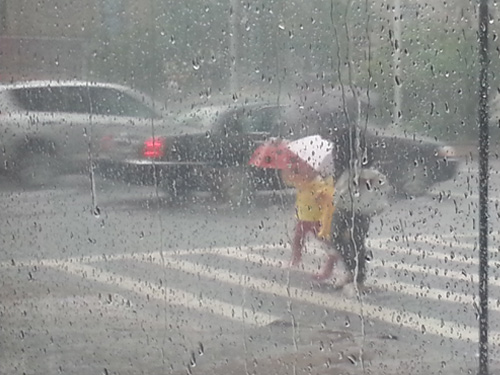PERIMETER BLOG
LATEST NEWS & INTERESTING FACTS“It rains a lot in the lower mainland.”
That’s Chris Gray, the owner and chief drainage guru here at Perimeter Drainage. While it might seem like an obvious statement, for Chris, it’s an element of our winter that’s still easy to forget.
Why? Because we don’t like the rain. It dampens our spirits just like it dampens our basements, so we choose to ignore it as much as possible.
Well, ignoring the fact that Vancouver is covered in rainy grey clouds for seven straight months and that North Vancouver in particular is home to countless instances of flooding due to the malicious nature of gravity is a dangerous game.
So, after I convinced him to take a break, here’s Chris Gray’s list of key water drainage tips to think about this winter.
An Intense Storm is Never Far Away
Evidence of Vancouver’s latest 10-year storm still litters the streets in the form of downed branches and demolished bus stops. Fortunately this evidence is relatively quick and easy to clean up.
Can the same be said about a storm’s effect on your home’s drainage capabilities?
“Global warming creates intense short-burst storms and our phone rings off the hook. A system that’s not maintained can’t cope when there’s too much water in a short time,” says Chris.
Pipes can get clogged with silt over time and sumps can get plugged without routine checks and maintenance. Driveways get covered in dirt or sediment and when they’re not cleaned regularly, large deposits run off into your drainage system.
Respect the Flow
Put up your hand if you’re guilty of washing your driveway and hosing all the debris down the small drain at the bottom of driveway. [puts up hand] Now shift your thinking and ask yourself where that debris is headed. Why doesn’t it drain as quick as it did last year?
You can guess what happens next. The silt and sediment and debris from your driveway is going to come back to haunt you.
It’s important to pay attention if your drains aren’t flowing as fast as you think they should. Is water coming into your garage? Is water pooling on your lawn?
“Take these situations seriously, or you’ll be paying more in the long run,” says Chris. The heavy rain is coming, so test your outdoor drains.
Anyone Can Perform Routine Maintenance
You don’t need to be a tech-savvy drainage expert to determine if you’ve got an issue with your system. You do need to be one to fix the problem, however.
Like an oil change on your car, if your pipes are plugged up then you ‘re backed up, and there are a lot of elements that can contribute to the back-up that you’re not responsible for, such as iron oxide. Areas rich with underground iron oxide can plug pipes gradually regardless of anything happening in the house.
How do we perform routine maintenance?
- Every 6 months: Check for iron oxide regardless of the age of the home.
- When seasons change: Flush your outdoor drains
- Between 1 and 5 years: get a video diagnostic by running a camera down the pipe.
For maintenance such as the video diagnostic, the age of your house comes into play. New houses only need a look inside the pipes after a couple of years, and in this case you’ll probably only need to flush the pipes, a quick and easy procedure. Older houses with greater back-log potential should check at least once each year.
One of the main problems with proper drainage is how a home was built.
“We do lots of repairs on new installations because costs are cut during construction on the things we can’t see,” says Chris. Pipes and other crucial materials running in the background aren’t given the same level of care because they’re unseen. Out of sight out of mind, so to speak.
But it’s these materials – your pipes, your wires, your foundation – that can cause the biggest headaches down the road.
And no one likes headaches. Especially if it’s raining.

